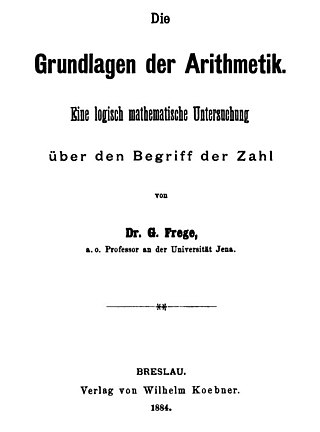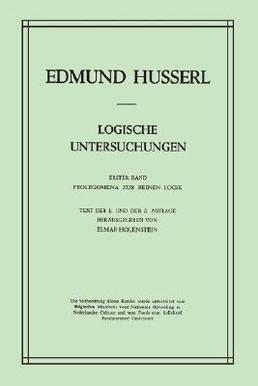Psychologism is a family of philosophical positions, according to which certain psychological facts, laws, or entities play a central role in grounding or explaining certain non-psychological facts, laws, or entities. The word was coined by Johann Eduard Erdmann as Psychologismus, being translated into English as psychologism. [1] [2]
The Oxford English Dictionary defines psychologism as: "The view or doctrine that a theory of psychology or ideas forms the basis of an account of metaphysics, epistemology, or meaning; (sometimes) spec. the explanation or derivation of mathematical or logical laws in terms of psychological facts." [3] Psychologism in epistemology, the idea that its problems "can be solved satisfactorily by the psychological study of the development of mental processes", was argued in John Locke's An Essay Concerning Human Understanding (1690). [4]
Other forms of psychologism are logical psychologism and mathematical psychologism. Logical psychologism is a position in logic (or the philosophy of logic) according to which logical laws and mathematical laws are grounded in, derived from, explained or exhausted by psychological facts or laws. Psychologism in the philosophy of mathematics is the position that mathematical concepts and/or truths are grounded in, derived from or explained by psychological facts or laws. [5]
John Stuart Mill was accused by Edmund Husserl of being an advocate of a type of logical psychologism, although this may not have been the case. [6] So were many nineteenth-century German philosophers such as Christoph von Sigwart, Benno Erdmann, Theodor Lipps, Gerardus Heymans, Wilhelm Jerusalem, and Theodor Elsenhans, [7] as well as a number of psychologists, past and present (e.g., Wilhelm Wundt [7] and Gustave Le Bon). [8]
Psychologism was notably criticized by Gottlob Frege in his anti-psychologistic work The Foundations of Arithmetic , and many of his works and essays, including his review of Husserl's Philosophy of Arithmetic . [9] Husserl, in the first volume of his Logical Investigations , called "The Prolegomena of Pure Logic", criticized psychologism thoroughly and sought to distance himself from it. Frege's arguments were largely ignored, while Husserl's were widely discussed. [1]
In "Psychologism and Behaviorism", Ned Block describes psychologism in the philosophy of mind as the view that "whether behavior is intelligent behavior depends on the character of the internal information processing that produces it." This is in contrast to a behavioral view which would state that intelligence can be ascribed to a being solely via observing its behavior. This latter type of behavioral view is strongly associated with the Turing test. [10] [11]

Edmund Gustav Albrecht Husserl was an Austrian-German philosopher and mathematician who established the school of phenomenology.
Philosophy of mathematics is the branch of philosophy that deals with the nature of mathematics and its relationship with other human activities.

Friedrich Ludwig Gottlob Frege was a German philosopher, logician, and mathematician. He was a mathematics professor at the University of Jena, and is understood by many to be the father of analytic philosophy, concentrating on the philosophy of language, logic, and mathematics. Though he was largely ignored during his lifetime, Giuseppe Peano (1858–1932), Bertrand Russell (1872–1970), and, to some extent, Ludwig Wittgenstein (1889–1951) introduced his work to later generations of philosophers. Frege is widely considered to be the greatest logician since Aristotle, and one of the most profound philosophers of mathematics ever.
The history of logic deals with the study of the development of the science of valid inference (logic). Formal logics developed in ancient times in India, China, and Greece. Greek methods, particularly Aristotelian logic as found in the Organon, found wide application and acceptance in Western science and mathematics for millennia. The Stoics, especially Chrysippus, began the development of predicate logic.
Analytic philosophy is an analysis focused, broad, contemporary movement or tradition within Western philosophy, especially anglophone philosophy. Analytic philosophy is characterized by a clarity of prose; rigor in arguments; and making use of formal logic and mathematics, and, to a lesser degree, the natural sciences. It is further characterized by an interest in language and meaning known as the linguistic turn. It has developed several new branches of philosophy and logic, notably philosophy of language, philosophy of mathematics, philosophy of science, modern predicate logic and mathematical logic.

Metamathematics is the study of mathematics itself using mathematical methods. This study produces metatheories, which are mathematical theories about other mathematical theories. Emphasis on metamathematics owes itself to David Hilbert's attempt to secure the foundations of mathematics in the early part of the 20th century. Metamathematics provides "a rigorous mathematical technique for investigating a great variety of foundation problems for mathematics and logic". An important feature of metamathematics is its emphasis on differentiating between reasoning from inside a system and from outside a system. An informal illustration of this is categorizing the proposition "2+2=4" as belonging to mathematics while categorizing the proposition "'2+2=4' is valid" as belonging to metamathematics.
Hume's principle or HP says that the number of Fs is equal to the number of Gs if and only if there is a one-to-one correspondence between the Fs and the Gs. HP can be stated formally in systems of second-order logic. Hume's principle is named for the Scottish philosopher David Hume and was coined by George Boolos.
Blockhead is a theoretical computer system invented as part of a thought experiment by philosopher Ned Block, which appeared in a paper titled "Psychologism and Behaviorism". Block did not personally name the computer in the paper.
Munich phenomenology is the philosophical orientation of a group of philosophers and psychologists that studied and worked in Munich at the turn of the twentieth century. Their views are grouped under the names realistphenomenology or phenomenology of essences. Munich phenomenology represents one branch of what is referred to as the early phenomenology. One of their contributions was the theory that there are different kinds of intentionality.
In logic, anti-psychologism is a theory about the nature of logical truth, that it does not depend upon the contents of human ideas but exists independent of human ideas.
In the philosophy of language, the context principle is a form of semantic holism holding that a philosopher should "never ... ask for the meaning of a word in isolation, but only in the context of a proposition".
The history of logic as a subject has been characterised by many disputes over what the topic deals with, and the main article 'Logic' has as a result been hesitant to commit to a particular definition of logic. This article surveys various definitions of the subject that have appeared over the centuries through to modern times, and puts them in context as reflecting rival conceptions of the subject.

Philosophy of Arithmetic: Psychological and Logical Investigations is an 1891 book about the philosophy of mathematics by the philosopher Edmund Husserl. Husserl's first published book, it is a synthesis of his studies in mathematics, under Karl Weierstrass, with his studies in philosophy and psychology, under Franz Brentano, to whom it is dedicated, and Carl Stumpf.

The Foundations of Arithmetic is a book by Gottlob Frege, published in 1884, which investigates the philosophical foundations of arithmetic. Frege refutes other idealist and materialist theories of number and develops his own platonist theory of numbers. The Grundlagen also helped to motivate Frege's later works in logicism.

Martin Kusch is Professor of philosophy at the University of Vienna. Until 2009, Kusch was Professor of Philosophy and Sociology of science at the Department of History and Philosophy of Science at Cambridge University. Prior to Cambridge, Kusch was lecturer in the Science Studies Unit of the University of Edinburgh.
In the philosophy of mathematics, formalism is the view that holds that statements of mathematics and logic can be considered to be statements about the consequences of the manipulation of strings using established manipulation rules. A central idea of formalism "is that mathematics is not a body of propositions representing an abstract sector of reality, but is much more akin to a game, bringing with it no more commitment to an ontology of objects or properties than ludo or chess." According to formalism, the truths expressed in logic and mathematics are not about numbers, sets, or triangles or any other coextensive subject matter — in fact, they aren't "about" anything at all. Rather, mathematical statements are syntactic forms whose shapes and locations have no meaning unless they are given an interpretation. In contrast to mathematical realism, logicism, or intuitionism, formalism's contours are less defined due to broad approaches that can be categorized as formalist.

A mathematical object is an abstract concept arising in mathematics. Typically, a mathematical object can be a value that can be assigned to a symbol, and therefore can be involved in formulas. Commonly encountered mathematical objects include numbers, expressions, shapes, functions, and sets. Mathematical objects can be very complex; for example, theorems, proofs, and even theories are considered as mathematical objects in proof theory.
Philosophy of logic is the area of philosophy that studies the scope and nature of logic. It investigates the philosophical problems raised by logic, such as the presuppositions often implicitly at work in theories of logic and in their application. This involves questions about how logic is to be defined and how different logical systems are connected to each other. It includes the study of the nature of the fundamental concepts used by logic and the relation of logic to other disciplines. According to a common characterisation, philosophical logic is the part of the philosophy of logic that studies the application of logical methods to philosophical problems, often in the form of extended logical systems like modal logic. But other theorists draw the distinction between the philosophy of logic and philosophical logic differently or not at all. Metalogic is closely related to the philosophy of logic as the discipline investigating the properties of formal logical systems, like consistency and completeness.

The Logical Investigations is a two-volume work by the philosopher Edmund Husserl, in which the author discusses the philosophy of logic and criticizes psychologism, the view that logic is based on psychology.

In linguistics, the term formalism is used in a variety of meanings which relate to formal linguistics in different ways. In common usage, it is merely synonymous with a grammatical model or a syntactic model: a method for analyzing sentence structures. Such formalisms include different methodologies of generative grammar which are especially designed to produce grammatically correct strings of words; or the likes of Functional Discourse Grammar which builds on predicate logic.